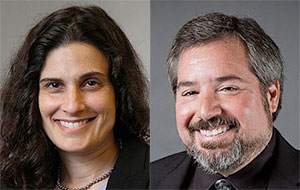President, Provost cite significant gains of 2013-2014, school community’s desire to maintain momentum

Case Western Reserve University announced today that Interim Deans Jessica Berg and Michael Scharf will continue to lead the School of Law through at least the 2014-2015 academic year. Since the pair began sharing the dean position last fall, the school has posted significant gains in admissions, graduates’ employment and annual fund contributions.
“From the very start of their leadership, Jessica and Michael made clear that the school’s success demanded a collective effort,” President Barbara R. Snyder said. “By encouraging active and broad engagement, they helped create an environment where everyone recognized they could contribute—and did.”
President Snyder and Provost W.A. “Bud” Baeslack III chose to keep Berg and Scharf in their roles after extensive consultation with the school’s faculty and senior staff, as well as ongoing feedback from alumni, students and other stakeholders. The university leaders asked law school constituents about launching a formal search for a new dean, but an overwhelming majority said now was not the time. Instead, they emphasized the remarkable momentum the school had begun to enjoy, as well as genuine admiration for the interim deans’ emphasis on collaboration and transparency.
“The community respects Jessica and Michael,” Provost Baeslack said, “and believes they can help continue the current positive trajectory. We appreciate their excellent work to date and look forward to seeing the school build on last year’s results.”
The president and provost said they would explore starting a search in 2015, a process that would involve additional conversations with stakeholders and an assessment of the law school’s status at the end of the upcoming academic year. Since the search process itself often takes at least six months, Berg and Scharf conceivably could serve for three years in the interim dean roles.
For now, however, the interim deans are far more focused on the next several weeks, as a new class arrives for orientation in mid-August. The year marks the first for the school’s innovative new curriculum. The three-year program includes even greater opportunities for hands-on learning, including a semester-long capstone experience as well as the opportunity to engage with clients within their first semester. Faculty members overwhelmingly approved the new approach last August, and have spent the past year adjusting courses and adding to the list of firms and organizations that will offer students summer and school-year placements.
“The work of our faculty and staff has been inspiring,” Berg and Scharf said in a statement, “and our alumni and other friends have opened their offices to help us give students the best possible preparation for careers after graduation.”
Employment proved to be one of the school’s bright spots this spring, as audited data showed that the Class of 2013 achieved a 6.5 percentage point increase over the previous year for overall employment, putting the final tally at 91 percent. This month, The National Jurist reported that the law school ranked 10th nationally in its improvement in employment results. In addition, the school saw 100 percent of its graduates pass the winter administration of the Ohio bar, and exceeded its annual fund goal by 12 percent.
But perhaps the most impressive outcomes came in admissions, where applications climbed by more than 60 percent and the incoming class grew by more than 50 percent over the previous year—with stronger academic credentials. Case Western Reserve achieved these results amid a national legal education landscape where numbers for both categories dropped. Berg and Scharf credit the increases to the new curriculum, remarkable efforts from faculty and staff and strategic guidance from university officials. As the incoming class actually experiences the new curriculum, the interim deans hope to attract even more forward-thinking students.
“Advancing our school of law is both a team effort and a process,” Berg and Scharf said in a statement. “Over the past nine months, our faculty and staff have worked tirelessly to demonstrate our strengths and commitment to students. Our alumni have called admitted students and supported us in countless other ways. And our current students also took the time to explain the advantages of coming to Case Western Reserve. Our gratitude to all of them cannot be overstated.”
The interim deans also thanked President Snyder and Provost Baeslack for giving them the original opportunity last fall, and then extending it today. President Snyder also spoke often with law school alumni during the year, while Provost Baeslack and his team provided advice and technical assistance regarding leadership and management of the school.
“An essential element of the school’s progress involved the unstinting support of the university’s leadership,” Berg and Scharf said. “They believed in the school’s enormous potential and did everything possible to help us begin to realize it this year. We look forward to rewarding their confidence with additional improvement in 2014-2015.”
